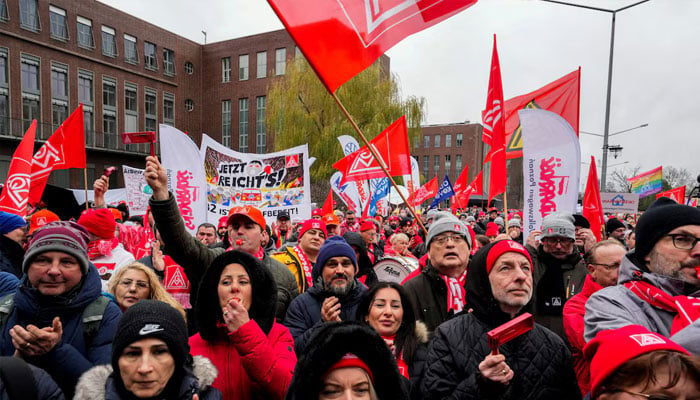Germany faces year of industrial strife as companies go into battle with workers
FRANKFURT/DUESSELDORF: Germany faces major labour disputes in 2025, as an established bond between firms and workers -- long seen as a pillar of the country’s economic success -- is starting to unravel in the wake of brutal competition, economic weakness and spiralling costs.
Labour bosses at industrial giants Bosch, Thyssenkrupp, ZF Friedrichshafen and Volkswagen -- jointly representing more than half a million German workers -- say that firms are showing a new level of determination to cut jobs, close factories and move staff abroad.
Unlike during previous crises, boards are less willing to compromise and in some cases have unilaterally ended wage agreements or broken off talks with workers, according to more than a dozen interviews with labour representatives, politicians, executives and economists in Germany.
That’s due to the poor health of Europe’s top economy, which has shrunk for the second consecutive year and staked much of its reputation on labour- and energy-intensive sectors such as cars and chemicals. Germany is now one of the world’s highest-cost countries.
This has raised the question of whether Germany’s legally enshrined principle of “co-determination”, which guarantees a major influence for workers on company’s supervisory boards, is becoming a liability by slowing down corporate restructuring.
Answering this will be high on the agenda of Germany’s next government, to be determined in a snap election on February 23.
“We have to brace for a year of disputes,” said Knut Giesler, deputy chairperson of Thyssenkrupp’s steel unit and head of the powerful IG Metall union in North Rhine-Westphalia, where the group is based.
He said Germany was currently experiencing a battle over co-determination, including at Thyssenkrupp where management and workers are clashing over plans to cut or outsource 11,000 jobs -- around 11 per cent of its workforce.
Giesler said steel workers could quickly go into dispute mode by freeing themselves from no-strike deals established under current labour pacts.
“The search for co-determination-free zones and the lowest labour costs is booming,” said Achim Dietrich, head of the works council at automotive supplier ZF Friedrichshafen, which mayclose around a third of its German plants and cut more than a quarter of German jobs.
“Some (executives) believe it is necessary to cut off an arm in order to save the rest of the body,” he said, adding the current situation was far worse than the 2008 financial crisis, when company leaders had been more open to compromise.
-
 AI Copyright Battle: ByteDance To Curb Seedance 2.0 Amid Disney Lawsuit Warning
AI Copyright Battle: ByteDance To Curb Seedance 2.0 Amid Disney Lawsuit Warning -
 Savannah Guthrie In Tears As She Makes Desperate Plea To Mom's Kidnappers
Savannah Guthrie In Tears As She Makes Desperate Plea To Mom's Kidnappers -
 Canada’s Defence Industrial Strategy Targets 125,000 Jobs And Export Growth
Canada’s Defence Industrial Strategy Targets 125,000 Jobs And Export Growth -
 Tre Johnson, Former NFL Guard And Teacher, Passes Away At 54
Tre Johnson, Former NFL Guard And Teacher, Passes Away At 54 -
 Jerome Tang Calls Out Team After Embarrassing Home Defeat
Jerome Tang Calls Out Team After Embarrassing Home Defeat -
 Cynthia Erivo Addresses Bizarre Rumour About Her Relationship With Ariana Grande
Cynthia Erivo Addresses Bizarre Rumour About Her Relationship With Ariana Grande -
 Prince Harry, Meghan Markle Spotted Cosying Up At NBA All-Star Game
Prince Harry, Meghan Markle Spotted Cosying Up At NBA All-Star Game -
 Lady Gaga Explains How Fibromyalgia Lets Her 'connect With People Who Have It'
Lady Gaga Explains How Fibromyalgia Lets Her 'connect With People Who Have It' -
 Metro Detroit Weather Forecast: Is The Polar Vortex Coming Back?
Metro Detroit Weather Forecast: Is The Polar Vortex Coming Back? -
 Daniel Radcliffe Reveals Surprising Way Fatherhood Changed Him
Daniel Radcliffe Reveals Surprising Way Fatherhood Changed Him -
 ‘Disgraced’ Andrew At Risk Of Breaking Point As Epstein Scandal Continues
‘Disgraced’ Andrew At Risk Of Breaking Point As Epstein Scandal Continues -
 Alan Cumming Shares Plans With 2026 Bafta Film Awards
Alan Cumming Shares Plans With 2026 Bafta Film Awards -
 OpenClaw Founder Peter Steinberger Hired By OpenAI As AI Agent Race Heats Up
OpenClaw Founder Peter Steinberger Hired By OpenAI As AI Agent Race Heats Up -
 Kate Middleton's Reaction To Harry Stepping Back From Royal Duties Laid Bare
Kate Middleton's Reaction To Harry Stepping Back From Royal Duties Laid Bare -
 Rose Byrne Continues Winning Streak After Golden Globe Awards Victory
Rose Byrne Continues Winning Streak After Golden Globe Awards Victory -
 Ice Hockey Olympics Update: Canada Stays Unbeaten With Dominant Win Over France
Ice Hockey Olympics Update: Canada Stays Unbeaten With Dominant Win Over France




